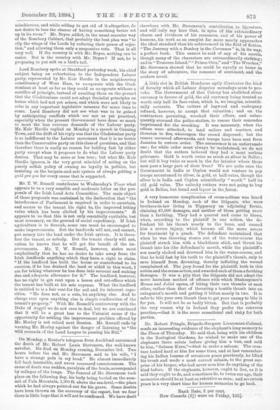Mr. T. W. Russell contributes to Wednesday's Times what appears
to us a very sensible and moderate letter on the pro- posals of the Irish Land Acts Committee. The main object of those proposals was contained in the declaration that " the interference of Parliament is required in order to ascertain, and secure to the tenant his right to, the improved letting value which has been elicited by his improvements." It appears to us that this is not only essentially equitable, but most necessary, on the ground of social expediency. If Irish agriculture is to flourish, some one must be encouraged to make improvements. But the landlords will not, and cannot, put money into the land under the Irish system. It is there- fore the tenant, or nobody. But the tenant clearly will not, unless he knows that he will get the benefit of the im- provements. Mr. T. W. Russell, however, states most emphatically that he has no desire to take away from the Irish landlords anything which they have a right to claim. "If the landlord has built the house or contributed to its erection, if he has drained the land or aided in this work, I am for taking whatever he has done into account and making due and adequate allowance for it." The landlord, however, has no right to get rent upon a house and out-offices which the tenant has built at his sole expense. What the landlord is entitled to is a fair rent for the soil and its inherent capa- cities. "He does not, as a rule, let anything else. And to charge rent upon anything else is simple confiscation of the tenant's property." With Mr. Russell's controversy with the Duke of Argyll we do not care to deal, but we are convinced that it will be a great loss to the Unionist cause if the opportunity for settling the improvement problem offered by Mr. Morley is not seized next Session. Mr. Russell ends by warning Mr. Morley against the danger of listening to "the wild counsels of the Land League in passing his Bill."

































 Previous page
Previous page